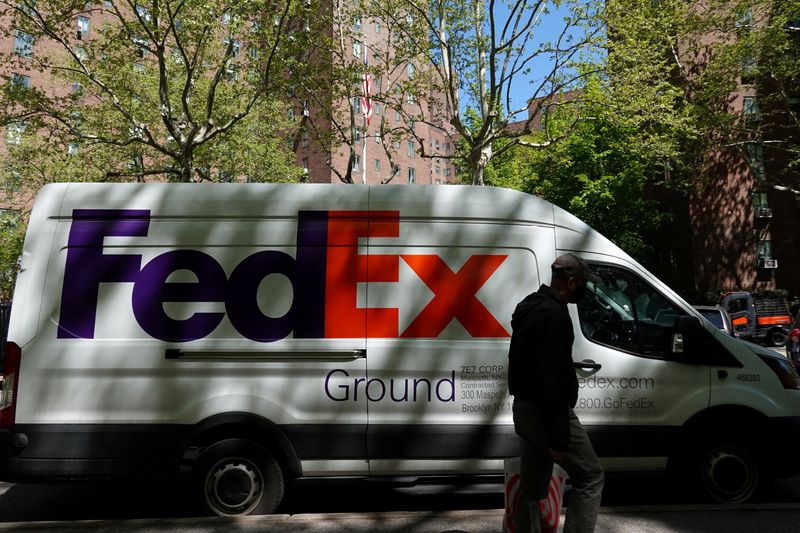By Lisa Baertlein
LOS ANGELES (Reuters) -FedEx Corp's new chief executive on Wednesday announced plans to boost future earnings by focusing on more profitable deliveries, but shares backtracked as the company's forecast for its growth-driving e-commerce delivery unit remained stuck below pre-pandemic levels.
"We are at a pivotal moment in the history of FedEx (NYSE:FDX) as we enter our 50th year," CEO Raj Subramaniam, who succeeded FedEx founder Fred Smith on June 1, said at the company's investor meeting. FedEx forecast per share earnings growth of 14% to 19% per year through 2025. It also expects revenue growth of 4% to 6% annually during that period.
Shares fell 2.6% to close at $233.81 after investors dug in to that outlook - particularly its call for Ground margin to increase to 11% to 12% by 2025. That Ground business handles the bulk of the company's e-commerce home deliveries. It reported margins of 13% or more in the two years before the COVID-19 online shopping boom that added millions more parcels to daily Ground routes.
As CEO, Subramaniam is grappling with cooling demand, rampant inflation and pressure from two competing groups: investors who want FedEx to wring more profit from its operations, and the company's Ground unit contractors who want more money to offset their rising costs.
Investors for years have bemoaned the company's inconsistent performance and redundant costs tied to its independently operated Express, Ground and Freight segments.
Activist investor D.E. Shaw Group this month gained two seats on FedEx's board and has been promised one more. The hedge fund is the first activist at FedEx and has not publicly shared its targets for the company.
FedEx's new emphasis on higher-profit deliveries or "revenue quality" echoes the "better not bigger" mantra adopted by rival United Parcel Service (NYSE:UPS) two years ago. Since then, UPS has outpaced FedEx on both profitability and service.
A slowing economy could erode the pandemic-era price increases FedEx needs to execute its new strategy and appease investors, analysts warn. Company executives countered by saying that FedEx offers shipping and delivery services that are difficult to replicate.
The shift paid off in the latest quarter. FedEx revenue jumped 8% even as the company handled fewer packages.
FedEx Ground reported an 11% rise in revenue per package despite a 6% drop in average daily volume. Ground's least expensive and slowest "economy" service took the biggest hit, with volume tumbling 36%.
Ground contractors rely on volume to help offset higher prices for gas, driver wages and delivering to far-flung residential addresses.
Jeff Walczak, CEO of Ground contractor consultancy eTruckBiz.com, said 20-25% of his clients are struggling to turn a profit - about double the normal rate.
"Most of the folks in this business have never seen a downturn in volume, and it's stinging them bad," Walczak said.

FedEx executives on Wednesday said they planned to take costs out of the Ground unit - a move that could add to contractors' financial stress.
Many of them work on fixed one-year contracts and have had difficulty negotiating more money from FedEx. Among other things, FedEx now wants to shift the cost of lost and damaged parcels to those operators, Walczak said.